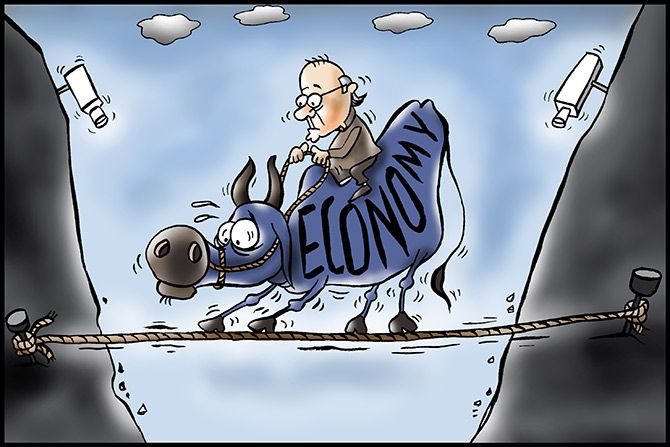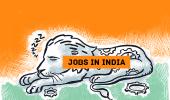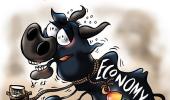'The government's full five-year term is unlikely to deliver more than 7+ per cent growth.'
'That's creditable, but no different from the 7.2 per cent achieved in the previous five years (2009 to 2014).'
'Those who expected the change of government to deliver a change of tempo would be disappointed,' says T N Ninan.
Illustration: Uttam Ghosh/Rediff.com

The economy began slowing down over a year ago.
The slowdown accelerated, if you will, after the November demonetisation, if one is to judge by the very modest 5.6 per cent increase in gross value added (GVA) during the January-March quarter -- down from 8.7 per cent a year earlier.
Over the same four quarters, growth in the manufacturing sector slumped to 5.3 per cent, from 12.7 per cent in January-March 2016, while construction activity contracted.
The big question therefore is whether the numbers for the April-June 2017 quarter will see a reversal of the slowdown.
Most pundits expect the slowdown to have bottomed out, with the next quarterly growth numbers to be better, or at worst a repeat at 5.5 to 6.0 per cent. Certainly, it is hard to believe that GVA growth could drop below the January-March level.
However, one should be cautious and not expect too much of an upswing, because the indications provided by the latest indices on manufacturing and services suggest that the unavoidable disruption caused by the introduction of the goods and services tax will affect the first half of 2017-18.
Some of the supporting data, such as corporate results and credit growth, offer no great hope either.
It is still possible that the contrariness of India's data collection systems might throw up some happy surprises at the end of August.
Even if that were to happen, India's economic growth is likely to remain at less than optimum.
The silver lining to this cloud is that a slowdown caused over three quarters by one disruption or other must end sooner than later.
Once the shock caused by demonetisation has been fully absorbed, and the disruption caused by the introduction of the GST is past, the growth numbers will automatically enjoy a bounce.
On top of that, there is a second good monsoon.
Better tax coverage could lead to better reporting.
At some stage, therefore, the relentless optimism of the stock market might become justified.
Still, no one is expecting for 2017-18 anything qualitatively different from the 7.1 per cent growth achieved in 2016-17.
The government's final year, 2018-19, could still see an economic step up from these levels, but the government's full five-year term is unlikely to deliver more than 7+ per cent GVA growth.
That's creditable, but no different from the 7.2 per cent achieved in the previous five years (2009 to 2014).
Those who expected the change of government to deliver a change of tempo would be disappointed.
The difference is that the Manmohan Singh government ended in a slump; the Modi government could do the opposite after a mid-term slump so the end narrative would be very different.
Indeed, some of the Modi government's efforts will begin to show results only in 2019 or later -- like the massive investments undertaken by the railways, and the belated revival of the highway programme.
The encouraging development is that the government has embarked on reforms more seriously in the past year than before.
Looking ahead, two 'unthinkables' are about to happen: Air India is to be sold, and the petroleum subsidy is to be all but eliminated.
If two or three more of the most problematic government companies were also to be sold, and a couple of the smallest, most under-capitalised government banks freed from State control, the Modi government would at long last establish that it is prepared to attack ideological holy cows.
Almost any economist listing the reforms that the Modi government has not undertaken begins with reform of labour laws.
While a rewriting of today's irrational laws is required, that only deals with the demand side of the labour market.
In some ways, the more important is the supply side -- reviving the skills programme and radically improving the quality of school and technical education.
Other steps too have to be taken co-terminously -- like re-setting the external value of the rupee, and establishing large supply chains for which the expansion of organised retailing is critical.
Work on these must begin now if a second Modi government is to show better results.











